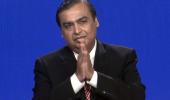With domestic retail fuel prices jumping to record high on rising international oil rates, India on Thursday pressed oil cartel OPEC for 'affordable' oil price within a 'reasonable band' and that the producers should phase out production cuts.

OPEC nations such as Saudi Arabia have traditionally been India's principal oil source.
But, OPEC and its allies, called OPEC+, ignoring its call for ease supply curbs had led to the world's third-biggest oil importer tap newer sources to diversify its crude oil imports.
As a result, OPEC's share in India's oil imports has dropped to about 60 per cent in May from 74 per cent in the previous month.
Petroleum Minister Dharmendra Pradhan in virtual dialogue with OPEC secretary general Mohammad Sanusi Barkindo reiterated concerns over oil prices, which have shot up above $75 per barrel - the highest since April 2019.
The spike has led to retail petrol and diesel prices climbing to a record high.
Petrol is above the Rs 100 per litre mark in 9 states and UTs, while diesel is being sold at over Rs 100 a litre in Rajasthan and Odisha.
"Minister Pradhan highlighted the importance of affordable and regular supplies of energy to drive economic and social progress, noting that his country is a major consumer and importer of oil," a statement issued by OPEC after the meeting said.
Later, a statement from the oil ministry said, "Pradhan flagged concerns over the increasing crude oil prices and its impact on consumers as well as on smart economic recovery.
"He emphasised that high crude prices are adding significant inflationary pressure on India."
Both sides discussed recent oil market developments, trends in oil demand recoveries, economic growth forecasts and overcoming energy challenges, among other issues of mutual interest.
"Pradhan reiterated his request of phasing out production cuts and also emphasised that crude prices should remain within a reasonable band, which will be in the collective interests of both consumers and producers and will encourage a consumption-led recovery," the ministry statement said.
He also stressed that all forms of energy will be needed to address India's growing energy needs.
"The minister, citing the growing cooperation between India and OPEC over the years, said: 'We regard OPEC as a vital energy partner,' expecting the ongoing cooperation to continue going forward," as per the statement by the oil cartel.
He noted that the ongoing cooperation comprises high-level dialogue and collaboration on the technical level.
In March, Pradhan and his Saudi Arabian counterpart were locked in a verbal duel after OPEC+ ignored India's plea to ease production control.
Saudi energy minister Prince Abdulaziz bin Salman asked New Delhi to instead use oil it bought at rock bottom rates last year.
Days later, Pradhan termed the statement as an "undiplomatic response from a friendly nation".
Thereafter, his ministry asked refiners to look at sources outside of the Middle East for buying oil.
This led to imports from Saudi Arabia, India's second-largest supplier after Iraq, slipping by about a quarter from a year earlier, while the United Arab Emirates slipped to being the seventh-largest supplier from being No 3 in April.
Nigeria, another OPEC nation, is now the No 3 supplier.
But, the outbreak of the second wave of COVID-19 infections, which led to severe scarcity of hospital beds and medical oxygen, led to New Delhi courting the Middle East nations for sourcing medical supplies.
"The minister (Pradhan) also thanked OPEC member countries, including the Kingdom of Saudi Arabia and the United Arab Emirates, for providing medical support during India's recent surge in COVID-19," the OPEC statement said.
OPEC said Barkindo and Pradhan discussed oil market developments.
"The video conference was held as part of the (OPEC) Secretariat's regular consultation programme and outreach activities with oil-consuming countries, as well as other producers and industry stakeholders.
"The discussions were part of the constructive relationship between OPEC and India, one of the world's largest oil consumers," it added.
The consultations, it said, focused on "exchanging views and reviewing the conditions of the global oil market, emerging trends related to energy, the recovery prospects for the world economy and other topical issues".
Barkindo, in his remarks, highlighted the improving outlook for the world economy and the global oil market.
OPEC's Monthly Oil Market Report for June projected that the global economy will grow by 5.5 per cent and oil demand will rise by 6 million barrels per day in 2021.
"The Secretary General additionally underlined the strategic role of the Declaration of Cooperation (DoC) in overcoming two global oil cycle downturns in 2015 and 2016, and in 2020, the latter caused by the COVID-19 pandemic."
The first high-level OPEC-India Energy Dialogue was held in New Delhi in December 2015.
The last and the fourth dialogue in the series was held via video conference on November 5, 2020.
The next dialogue meeting is expected to take place later this year.
Photograph: Richard Carson/Reuters











 © 2025
© 2025